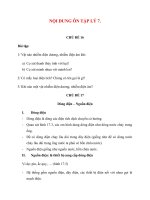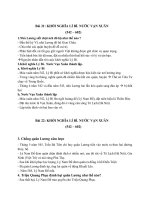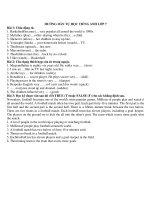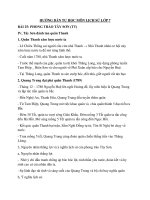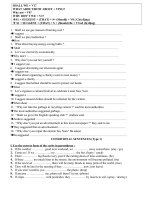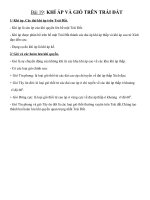Hướng dẫn học sinh tự học và ôn tập tại nhà đợt 2 môn Anh 9
Bạn đang xem bản rút gọn của tài liệu. Xem và tải ngay bản đầy đủ của tài liệu tại đây (87.96 KB, 5 trang )
<span class='text_page_counter'>(1)</span><div class='page_container' data-page=1>
<b>SHALL WE + V1?</b>
<b>WHAT ABOUT/HOW ABOUT + VING?</b>
<b>Why not + V0?</b>
<b>WHY DON’T WE + V1?</b>
S1 + SUGGEST + (THAT) + S+ (Should) + V0 ( Chủ động)
S1 + SUGGEST + (THAT) + S + (Should) Be + V3/ed (bị động)
1. Shall we use gas instead of burning coal ?
I suggest ………
2. Shall we play badminton ?
How ………..
3. What about buying energy-saving bulbs ? .
Shall ………
4. Let’s use electricity economically.
Why don’t ……….
5. Why don’t you ask her yourself ?
I suggest you……….
6. I suggest decorating our classroom again.
I suggest our………
7. What about organizing a charity event to raise money ?
I suggest a charity………
8. I suggest that helmet should be used to protect our heads.
What ………
9. Let’s organize a cultural festival to celebrate Lunar New Year.
I suggest a ………
10. I suggest unused clothes should be collected for the victims.
What about ………
11. “Why not take the garbage to recycling centers ?” said the local authorities.
The local authorities suggested garbage………
12. “Shall we go to the English speaking club ?” Andrew said.
Andrew suggested ………
13. “Why don’t you put an advertisement in this local newspaper ?” they said to me.
They suggested that an advertisement………
14. “Why don’t you repair the electric fan, Nam” Ba asked.
Ba suggested ………
<b>CONDITIONAL SENTENCES (Type 1)</b>
<b>I. Use the correct form of the verbs in parentheses :</b>
<b>1.</b> If the weather …………. good next weekend, we ……… away somewhere. (stay / go)
<b>2.</b> Come on ! If we ………, we ……… the bus. (hurry / catch)
<b>3.</b> There ……… big floods every year if the cutting down of trees continues. (be)
<b>4.</b> If there ……… too much litter in the streets, the environment will become polluted. (be)
<b>5.</b> If the sea level ………, there will be many floods in many parts of the world. (rise)
<b>6.</b> They will be late for the meeting if they ……… now. (not leave)
<b>7.</b> If you aren’t careful, you ………. the plates. (drop)
<b>8.</b> If anyone ……… me, please tell them I’m out. (phone)
</div>
<span class='text_page_counter'>(2)</span><div class='page_container' data-page=2>
10 If he ………. too much pesticide on vegetables, they will become edible. (not use)
<b>II. Combine each pairs of these sentences, using IF : </b>
1. Recycle and we’ll save natural resources.
………..
2. Be careful or you will fall over the rocks.
………... ………
3. Working too much can make you feel tired
. ………..
4. Don’t be careless or you’ll break the vase..
………..
5. Keep silent or you’ll wake the baby up.
……….
6. Because you don’t leave immediately, I call the policeman.
……….
7. Go right now or you will be late for the train.
………
8. Go right now or you will be late for the train.
………
<b>III: Choose the correct words or phrases to fill in the blanks: </b>
1. When the truck leave the place, the ground is covered_______trash
A. with B. in C. by D. of
2. The local authority should________the fish catching by electricity.
A. turn off B. allow C. prohibit D. recycle
3. It’s raining,_______I can’t go to the beach.
A. Because B. Even though C. Therefore D. so
4 Ba is pleased________his English is improving day by day.
A. that B. so C. but D. therefore
5. The newspaper is______________every day. It’s a daily newspaper.
A. publishing B. published C. to publish D. publish
6. You should get a/an_________to make sure there are no cracks in the pipes.
A. plumber B. engineer C. farmer D. cook
7. If people ______using dynamite for fishing, a lot of sea creatures will be well preserved
A. will stop B. stop C. are stopping D. stopped
8. Crop are sprayed with__________to kill insects
9. - “Thank you very much for your nice gift.” – “_________________________.”
10.
“_____________________”- “Not a bad idea”
A. I suggest going
out now B. Thanks for your help C. Let me help you D. Don’t worry about me
<b>IV: Supply the correct form of the words in parentheses: </b>
A. pesticide B. fertilizer C. dung D. compost
</div>
<span class='text_page_counter'>(3)</span><div class='page_container' data-page=3>
1. Water is going all over the floor because of the (drip)__________faucet.
2. Companies now realize that (consume)________need good quality products.
3. This system works _________so many workers finish their work on time. (effect)
4. How can we keep our environment__________(pollute).
<b>V. Rewrite the following sentences with the same meanings: </b>
1. Why don’t we use bicycles instead of motorbikes?
I suggest that bicycles_______________________________________
2. Because of having a lot of difficulties, she managed to sell the house.
As_______________________________________
3. Don’t litter or your place will be a junk-yard.
If you__________________________________________________
4. I’m disappointed. He didn’t phone me last night.
I’m __________________________________________________________________
<b>UNIT 7: SAVING ENERGY</b>
<b>[TIẾT KIỆM NĂNG LƯỢNG]</b>
9.
10. energy (n): năng lượng
11. bill(n): hóa đơn
12. enormous a): quá nhiều, to lớn
13. reduce ( v): giảm
+ reduction (n): sự giảm lại
14. plumber (n): thợ sửa ống nước
15. crack (n): đường nứt
16. pipe (n): đường ống (nước)
17. bath (n): bồn tắm
18. faucet (n) = tap: vòi nước
19. drip (v): chảy thành giọt
20. right away = immediately: (adv) ngay lập
tức
21. folk (n): người
22. explanation /(n): lời giải thích
23. bubble / (n): bong bóng
24. valuable / (a): q giá
25. keep on = go on = continue: tiếp tục
26. minimize / (v): giảm đến tối thiểu
27. complain to s.o / (v): than phiền, phàn nàn
28. complicated (a): phức tạp
29. + complication (n): sự phức tạp
30. resolution (n): cách giải quyết
31. politeness / n): sự lịch sự
32. label /ˈleɪbl/ (v): dán nhãn
33. transport //(v): vận chuyển
34. clear up: dọn sạch
35. truck (n): xe tải
36. look forward to + Ving: mong đợi
37. break (n): sự ngừng / nghỉ
38. refreshment (n): sự nghỉ ngơi
39. fly / (n): con ruồi
40. worried about: lo lắng về
41. float / (v): nổi
42. surface / (n): bề mặt
43. electric shock (n): điện giật
44. wave (n): làn sóng
</div>
<span class='text_page_counter'>(4)</span><div class='page_container' data-page=4>
46. + local authorities: chính quyền đại
phương
47. prohibit /prəˈhɪbɪt/ (v) = ban (v) : ngăn
cấm
48. + prohibition /ˌprəʊɪˈbɪʃn/ (n): sự ngăn
cấm
49. fine / (v): phạt tiền
50. tool / / (n): dụng cụ
51. fix / (v): lắp đặt, sửa
52. appliance (n): đồ dùng
53. solar energy: năng lượng mặt trời
54. nuclear power: năng lượng hạt nhân
55. power (n) = electricity: điện
56. heat / (n, v) : sức nóng, làm nóng
57. install / /(v): lắp đặt
58. coal / (n): than
59. luxuries / (n): xa xỉ phẩm
60. necessities / (n): nhu yếu phẩm
61. consume / (v): tiêu dùng
+ consumer / (n): người tiêu dùng
+ consumption / (n): sự tiêu thụ
62. effectively / (adv): có hiệu quả
63. household /ˈ/ (n): hộ, gia đình
64. lightning / (n): sự thắp sáng
65. account for: chiếm
66. replace / (v): thay thế
67. bulb /bʌlb/ (n): bóng đèn trịn
68. energy-saving (a): tiết kiệm năng lượng
69. standard / n): tiêu chuẩn
70. last / (v): kéo dài
71. scheme n): plan kế hoạch
72. freezer (n): tủ đông
73. tumble dryer máy sấy
74. compared with: so sánh với
75. category /ˈkætəɡəri/ (n): loại
76. ultimately / / (adv) = finally: cuối cùng,
sau hết
77. as well as : cũng như
78. innovate / (v) = reform /: đổi mới
+ innovation (n) = reform: sự đổi mới
79. conserve / (v): bảo tồn, bảo vệ
+ conservation (n): sự bảo tồn
80. purpose /ˈ/ (n): mục đích
81. speech /spiːtʃ/ (n): bài diễn văn
82. sum up: tóm tắt
83. public transport: vận chuyển công cộng
84. mechanic /(n): thợ máy
85. wastebasket / (n): sọt rác
<b>READ (dịch)</b>
In Western countries, electricity, gas, and water are not luxuries but necessities. Companies now realize that
consumers want products that will not only work effectively, but also save money.
For most North American households, lighting accounts for 10 percent to 15 percent of the electricity bill.
However, this amount can be reduced by replacing an ordinary 100-watt light bulb with an energy-saving bulb.
These bulbs use a quarter of the electricity of standard bulbs and last eieht times longer. Therefore consumers
can save about US$7 to US$21 per bulb.
In Europe, there is a labeling scheme for refrigerators, freezers, washing machines and tumble dryers. The
label tells the consumers how much energy efficiency each model has, compared with other appliances in the
same category.
Ultimately, these innovations will save money as well as conserve the Earth's resources.
</div>
<span class='text_page_counter'>(5)</span><div class='page_container' data-page=5>
</div>
<!--links-->
